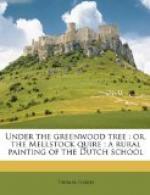Mr. Penny, as is the case with excitable boot-makers and men, seeing the vicar look at him and hearing no word spoken, thought it incumbent upon himself to say something of any kind. Nothing suggested itself till he had looked for about half a minute at the vicar.
“You’ll excuse my naming of it, sir,” he said, regarding with much commiseration the mere surface of the vicar’s face; “but perhaps you don’t know that your chin have bust out a-bleeding where you cut yourself a-shaving this morning, sir.”
“Now, that was the stooping, depend upon’t,” the tranter suggested, also looking with much interest at the vicar’s chin. “Blood always will bust out again if you hang down the member that’s been bleeding.”
Old William raised his eyes and watched the vicar’s bleeding chin likewise; and Leaf advanced two or three paces from the bookcase, absorbed in the contemplation of the same phenomenon, with parted lips and delighted eyes.
“Dear me, dear me!” said Mr. Maybold hastily, looking very red, and brushing his chin with his hand, then taking out his handkerchief and wiping the place.
“That’s it, sir; all right again now, ’a b’lieve—a mere nothing,” said Mr. Penny. “A little bit of fur off your hat will stop it in a minute if it should bust out again.”
“I’ll let ’ee have a bit off mine,” said Reuben, to show his good feeling; “my hat isn’t so new as yours, sir, and ’twon’t hurt mine a bit.”
“No, no; thank you, thank you,” Mr. Maybold again nervously replied.
“’Twas rather a deep cut seemingly?” said Reuben, feeling these to be the kindest and best remarks he could make.
“O, no; not particularly.”
“Well, sir, your hand will shake sometimes a-shaving, and just when it comes into your head that you may cut yourself, there’s the blood.”
“I have been revolving in my mind that question of the time at which we make the change,” said Mr. Maybold, “and I know you’ll meet me half-way. I think Christmas-day as much too late for me as the present time is too early for you. I suggest Michaelmas or thereabout as a convenient time for both parties; for I think your objection to a Sunday which has no name is not one of any real weight.”
“Very good, sir. I suppose mortal men mustn’t expect their own way entirely; and I express in all our names that we’ll make shift and be satisfied with what you say.” The tranter touched the brim of his imaginary hat again, and all the choir did the same. “About Michaelmas, then, as far as you are concerned, sir, and then we make room for the next generation.”
“About Michaelmas,” said the vicar.
CHAPTER V: RETURNING HOME WARD
“’A took it very well, then?” said Mail, as they all walked up the hill.
“He behaved like a man, ’a did so,” said the tranter. “And I’m glad we’ve let en know our minds. And though, beyond that, we ha’n’t got much by going, ’twas worth while. He won’t forget it. Yes, he took it very well. Supposing this tree here was Pa’son Mayble, and I standing here, and thik gr’t stone is father sitting in the easy-chair. ‘Dewy,’ says he, ‘I don’t wish to change the church music in a forcible way.’”




